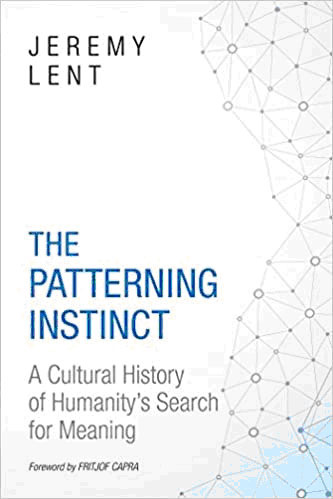Title: The Patterning Instinct: A Cultural History of Humanity’s Search for Meaning
Author: Jeremy Lent
Publisher: Prometheus Books, 2017

The author
Jeremy Lent is a Cambridge University literature graduate, a Dot Com entrepreneur with an interesting and colourful past, and now a sustainability guru calling himself an integrator.
The book
The basic premise of the book is that human history can be studied through the lens of human cognitive development, a new approach to history. The metaphors and world view held by society are instrumental to its future.
Lent has integrated/synthesised the research and thinking from literally hundreds of sources. In a work of five hundred plus pages there are over a hundred pages of notes, further reading and references. He has drawn upon disciplines as diverse as archaeology, neuroscience, and systems theory – the study of complexity and chaos.
The book opens by contrasting the voyages of Chinese Admiral Zheng with an armada of three hundred vessels and the voyage of Christopher Columbus in three leaky boats. Columbus changed the course of history and Zheng’s armada left almost no imprint on the world.
So why aren’t we all speaking Chinese? Lent contrasts the deeply seated metaphors underpinning Chinese and European thinking and values: how each society views their position in the world.
Dualistic thinking and monotheistic religions figure heavily in Lent’s discussion. And he also explores the question “why the Industrial Revolution occurred in Europe and not the Islamic world or the Chinese world”, which were both more technically advanced at the time.
The Patterning Instinct is professionally written and easy to read, even if the subject matter is difficult to comprehend. The book contains challenging and frightening conjectures, for example, that the “will of the people”, even in Western societies, is manipulated by a small elite group of society, and the species humans exploit the most is – humans!
In the final chapter Lent turns to systems theory and the study of complexity to suggest humanity is about to go through a period of significant transition. He couples this with his cognitive history to explain some of the human forces at play, speculating about, but not predicting, potential directions. We have a choice, he suggests.
It would be easy to dismiss Lent as just another new-age guru trying to make a living from humanity’s need to find meaning to our lives, but this work deserves more than a casual “oh, I read an interesting book the other day…” while sipping a chardonnay.
Reviewed by: Frank Thompson, June 2020
Ballarat Writers Inc. Book review group
Leave a Reply